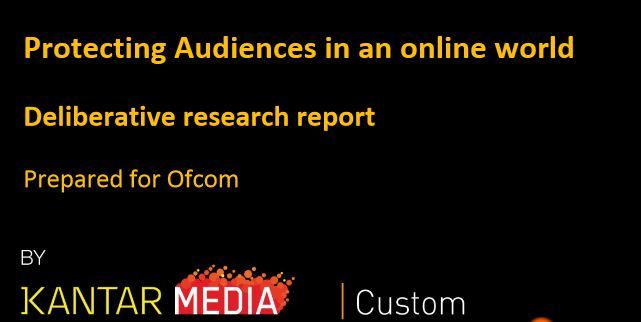Search
News categories
Protecting Audiences in an online world, a new Ofcom commissioned research
Protecting Audiences in an online world, a new Ofcom commissioned research
 On 4 December 2014, Ofcom published the outcome of recent research conducted by Kardar Media, which deals with audience views of protections for audiovisual content delivered across different platforms and connected devices.
On 4 December 2014, Ofcom published the outcome of recent research conducted by Kardar Media, which deals with audience views of protections for audiovisual content delivered across different platforms and connected devices.
Ofcom commissioned Kantar Media to conduct a series of research workshops with 132 members of the public to understand what people think of current protections for audiovisual content delivered on different platforms and on a range of internet connected devices, and what protections they consider they should have both now and in the future.
The key findings are as follows:
-
With regard to understanding and perceptions of current regulation, it turned out that regulation of audiovisual content was considered to be highly important, yet there was limited understanding of how regulatory arrangements vary by viewing platform. However, there was broad understanding that the internet generally was not a protected or regulated environment.
-
With regards to devices, the regulation of TV sets was perceived as most important, whereas the regulation of more personal devices, such as smartphones and tablets was considered less important as they were associated with more active viewing choices. Views on the regulation of connected devices were influenced by participants’ levels of technological aptitude and confidence.
-
Concerning platforms, the regulation of broadcast TV was considered most important. Most participants expected catch-up TV to be regulated to a similar standard as broadcasting. However, perceptions of the regulation of on-demand and other internet content varied amongst the participants.
-
In terms of content standards, the protection of minors was considered the most essential area for protection and assurance.
-
As to content information, it was recognised as important in guiding viewing decisions, yet did not provide complete assurance when used in isolation.
-
Concerning tools, the vast majority of participants noted that tools, such as PIN protections, programme scheduling, technical controls and availability of channels on the EPGs, were not enough in isolation, and information was required to guide which content items were controlled with tools. The awareness of and confidence in access tools was highest amongst younger and more technology engaged participants.
-
Concerning protection and assurance in the future, participants discussed a selection of future scenarios, which introduced varying levels of protection across broadcast TV, catch-up, on-demand, and other internet viewing. There was broad agreement that broadcast TV should continue to be regulated to a high standard in the future. There was consensus amongst the majority of participants that catch-up should be regulated to the same high standards as broadcast TV. The regulation of on-demand proved more divisive, with "protectionist viewpoints" favouring increased regulation and "libertarian viewpoints" defending the status quo. The future regulation of other internet content was the most contentious area with "libertarians" defending online freedoms and "protectionists" viewing increased regulation as a priority.
This report is the latest of a long series of Ofcom's produced or commissioned reports to document new trends in viewing and consumption patterns, the awareness and use of protection tools and the attitudes and expectations concerning regulation. The present report comes two years after the Ofcom's commissioned Ipsos Mori research on "Protecting Audiences in a converged world" which was also dealing with audience views of protections for audiovisual content delivered across different platforms and connected devices.
With regard to Media Literacy related topics, "Children and parents: Media use and attitudes in the nations" was published in January, "Adults’ Media Use and Attitudes Report 2014" was published in March, "Children’s online behaviour: issues of risk and trust" was published in September, "Internet Citizens 2014" was published at the end of November to provide an overview of people’s online use of such services and content in a range of citizen-orientated areas.
In addition, the British Government asked Ofcom to produce three reports on internet filters and online safety. The first, published in January 2014 "Ofcom Report on Internet safety measures - Strategies of parental protection for children online" looked at parental strategies for protection of children online reviewing Ofcom’s Media Literacy research from 2012 and 2013. The second report "Ofcom Report on Internet safety measures Internet Service Providers: Network level filtering measures" (July 2014) set out the measures put in place by the UK’s four largest ISPs (BT, Sky, TalkTalk and Virgin Media) to introduce a family-friendly network level filtering service, which allows the account holder to choose to block web based content that might be inappropriate for children at a network level. The final report is announced for early in 2015 and will review Ofcom’s Media Literacy research from 2014 on parental strategies for protection of children online.
Source: Ofcom
Attached Documents
Countries
See also
- Ofcom reports on strategies of parental protection for children online posted on 27 January, 2014 01:00
- New Edition of Ofcom's Adults’ Media Use and Attitudes Report posted on 07 May, 2014 02:00
- Ofcom: Children and Parents Media Use and Attitudes Report 2014 posted on 09 October, 2014 02:00